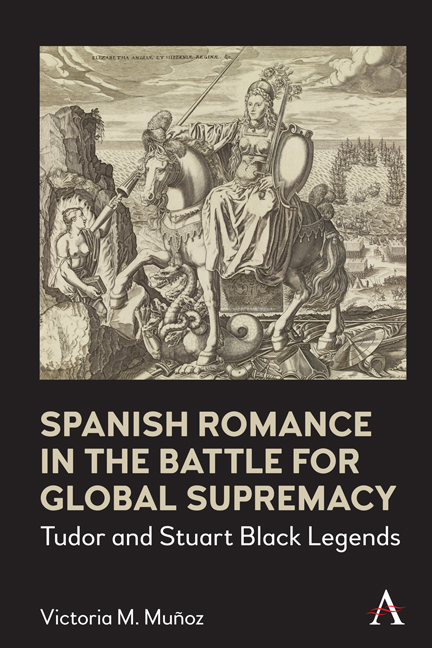Book contents
- Frontmatter
- Contents
- List of Figures
- Acknowledgments
- Prologue: Translating Romance, Empire, and Spain
- Chapter One “Books of the Brave” English: Spanish Tales of Love and Arms in Translation
- Chapter Two Dream Visions and Competing Dreams: Rewriting the Spanish Model in America
- Chapter Three Sun Kings and Moon Queens: The Courting and Uncourting of Spain
- Chapter Four Signs of England: Redcrosse Crosses the Ancient Boundary
- Chapter Five Believing Bottom’s Dream: Rationalizing Exploration from America to Australia
- Chapter Six Unruly Readers: Anti-Spanish Sentiment and the Feminizing of Romance
- Epilogue: Spanish Literature in England before Don Quixote
- Appendix I English Readership of Spanish Romance, By the Numbers
- Selected Bibliography
- Index
Chapter Three - Sun Kings and Moon Queens: The Courting and Uncourting of Spain
Published online by Cambridge University Press: 22 February 2022
- Frontmatter
- Contents
- List of Figures
- Acknowledgments
- Prologue: Translating Romance, Empire, and Spain
- Chapter One “Books of the Brave” English: Spanish Tales of Love and Arms in Translation
- Chapter Two Dream Visions and Competing Dreams: Rewriting the Spanish Model in America
- Chapter Three Sun Kings and Moon Queens: The Courting and Uncourting of Spain
- Chapter Four Signs of England: Redcrosse Crosses the Ancient Boundary
- Chapter Five Believing Bottom’s Dream: Rationalizing Exploration from America to Australia
- Chapter Six Unruly Readers: Anti-Spanish Sentiment and the Feminizing of Romance
- Epilogue: Spanish Literature in England before Don Quixote
- Appendix I English Readership of Spanish Romance, By the Numbers
- Selected Bibliography
- Index
Summary
From Diana and Amadís to Orlando and Espejo, love stories precipitated Spain's rise to global supremacy, especially by the king's “preferred strategy of matrimonial imperialism.” But as stories of love and arms were incorporated into the cultural and political diet of the Elizabethan court, carrying over discourses of Spanish conquest, an English politic of virtuous imperialism emerged as a distinct wartime strategy to combat the ambitions of the Spanish king, bent on global conquest. This ethic transformed romance's conventional love discourse into a mirrour for Spanish lust, mobilizing Elizabethan chastity as an imperial antidote.
Embodied in Elizabeth's faerie analogs, Gloriana, Belphoebe, and Britomart, female virtue became an overarching trait of England's self-fashioned civility. Drawn in imitation of Spanish and Italian romance heroines, these Elizabethan characters were central to Spenser's poetics of piracy. Figures that had once brought dishonor upon the queen now denoted England's cosmic empire of virtue. The altering event was the publication of Spenser's 1590 Faerie Queene, which transformed Oriana into Gloriana, and Claridiana into Belphoebe and Britomart, glorious harbingers of England's destined supremacy in the project of global conquest.
Gloriana Triumphs
That Spenser chose to adapt Oriana into Gloriana is somewhat surprising, especially for the first edition of The Faerie Queene of 1590, when he lacked assurance of royal patronage. Spenser must have known that his queen would immediately catch the reference; the Ambassador de Spes controversy was, after all, a “well-documented diplomatic incident” and international scandal. But whereas Spes had cited Amadís to forecast Spain's happy ending by imperial matrimony, Spenser used the same work to forecast England's triumph in virtue. Gloriana was a superlative improvement upon her Spanish romantic forebear; she cited the Second Coming in relation to Elizabeth's destined ascendance as world savior. This technique drew out Oriana's eponymous equation with the sun, capping Elizabeth's imagined rise to world empress. To drive home his point, Spenser created Archimago, a high sorcerer in his poem, in parallel to Amadís's infamous necromancer, Arcaláus, whom Spes had earlier compared to Cecil. Archimago was designed to mock the Spanish king as an “architect of false images” through the etymology of his name.
- Type
- Chapter
- Information
- Spanish Romance in the Battle for Global SupremacyTudor and Stuart Black Legends, pp. 67 - 94Publisher: Anthem PressPrint publication year: 2021



